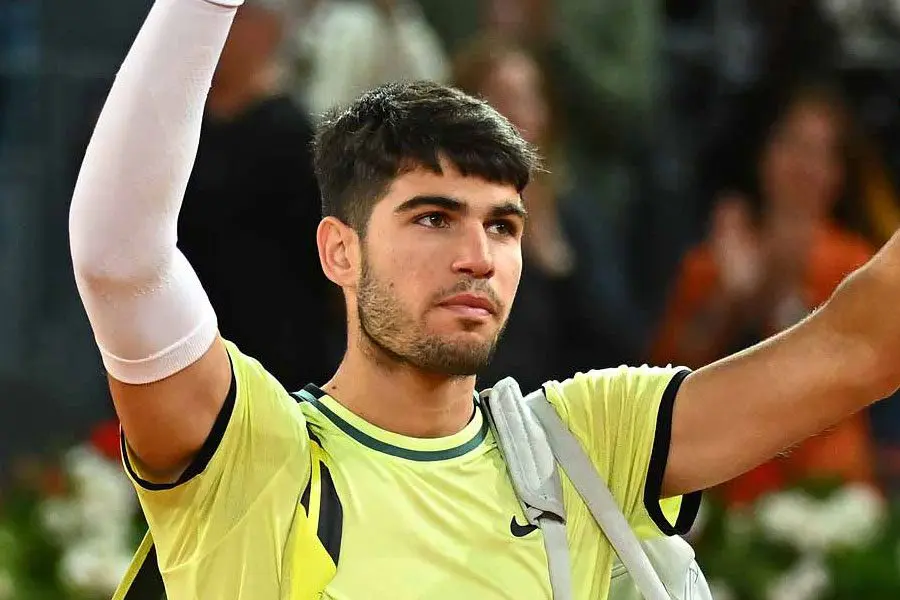
In September 2025, the top golfers from the United States and Europe will converge on Bethpage Black Course in Farmingdale, New York, to renew hostilities in the 45th edition of the Ryder Cup. The Europeans hold the trophy, but can they defend it on foreign soil? Let’s check out the latest odds and the key betting markets for golf’s greatest rivalry.
Best golf betting sites
Terms & Conditions Apply. Visit BetOnline for more information.
2025 Ryder Cup odds
- USA – -149.25
- Draw – +1100
- Europe – +170
See more odds at BetOnline
Top Ryder Cup betting markets
This is not your average PGA Tour event. The Ryder Cup’s special matchplay format lends itself to an entirely different style of golf betting than you see in regular strokeplay tournaments. Popular markets include:
- Outright winner – Which team will win the Ryder Cup: Europe or the USA? This is the simplest bet in the book, and one you can make many months in advance.
- Match betting – Which team or player will win the match? Bookmakers run straight markets for all 28 matches at the Ryder Cup, along with a number of distinct variations.
- Handicap betting – If we back the USA to win the Ryder Cup with a -2.5 handicap, the bet only pays if they get up by three points or more. Handicaps can apply to both outright results and individual matches.
- Margin betting – How many points will separate the winner and the loser? Golf bookies offer a variety of different margin markets, including over/under odds, exact outcomes and points groups.
- Correct score – This is a tricky one, as you have to pick the exact points total of each team. As with handicaps and margins, bookies often post correct score odds for both the title and individual matches.
- Player betting – How many points will Jordan Spieth score at the Ryder Cup? Will Dustin Johnson win more matches than Rory McIlroy? Once the teams are announced, bookies will have futures odds for every player in the field.
43rd Ryder Cup at Whistling Straits
Friday, September 25 – Sunday, September 27
If it’s drama you want, the rugged Lake Michigan shoreline just north of Sheboygan, Wisconsin is a good place to find it. The Straits Course at Whistling Straits is a quirky links-style layout that features big dunes, lots of sand and long, wind-affected approaches. The Pete Dye design is no stranger to major tournaments, having hosted three PGA Championships – two of which (2004 and 2010) were resolved in sudden death.
Signature holes
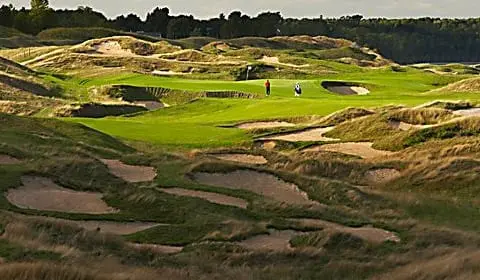
#11 – Sand Box
Par 5, 645 yards.
No prizes for guessing how this monster earned its nickname. Dozens of bunkers frame the fairway from tee to green, but none more imposing than the massive pit of doom that lies waiting to catch careless layups and mishit approaches about 100 yards out from the flag. Unless there is a significant tailwind (which is not unheard of on this exposed section of the course), this is a genuine three-shot hole for even the longest hitters in world golf.

#13 – Cliff Hanger
Par 4, 403 yards.
If you are going to miss with your drive at the 13th, it has to be left. Otherwise, you are playing your second from a gnarly tangle of sand traps and long rough that slopes several feet below the fairway – if you can find your ball, that is. A narrow, undulating green perched on the edge of Lake Michigan creates a charming and challenging finish to a hole that pleases the eye while testing even the shrewdest golfer’s shotmaking skills and strategic nous.
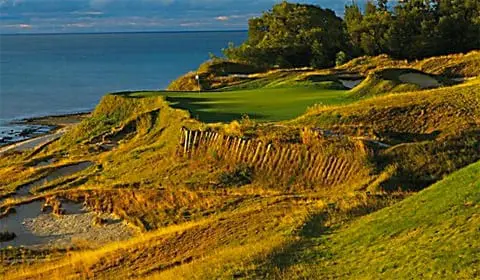
#17 – Pinched Nerve
Par 3, 249 yards.
Is there a golf course anywhere in the world that boasts a more impressive collection of par threes? Most dazzling of all the one shotters at Whistling Straits is the penultimate hole, where anything left, right, short, or long from the tee is destined for some sort of danger. Tricky headwinds, gorgeous views of the water and the ever-present potential for disaster make this the absolute standout on a layout that is littered with show stoppers.
Ryder Cup matchplay format
Whereas most golf tournaments are strokeplay events, the Ryder Cup is decided by matchplay. Instead of tallying the number of strokes by each player or team over the course of 18 holes, points are awarded based on each side’s score on every hole. For example: if Europe take four shots on the first hole and the United States have five, the Europeans win the hole. In the event of a tie, the hole is ‘pushed’ and no points are given.
Since 1979, the Ryder Cup schedule has followed more or less the same format: four groups of foursomes and four of fourballs on day one; the same again on day two; and 12 singles matches on the final day. One point is awarded to the winner of each match and half a point to both sides for ties, so there are 28 points on offer altogether.
- Foursomes – In teams of two, partners take alternate shots with the same ball. One player tees off on all odd-numbered holes, while the other hits first on all even-numbered holes.
- Fourballs – In teams of two, each golfer plays their own ball the whole way round. If the two teammates finish a hole with different scores, only the better score is taken.
- Singles – Players from each team square off in standard one-on-one matchplay over 18 holes.
2025 Ryder Cup teams
Ryder Cup Team USA 2025
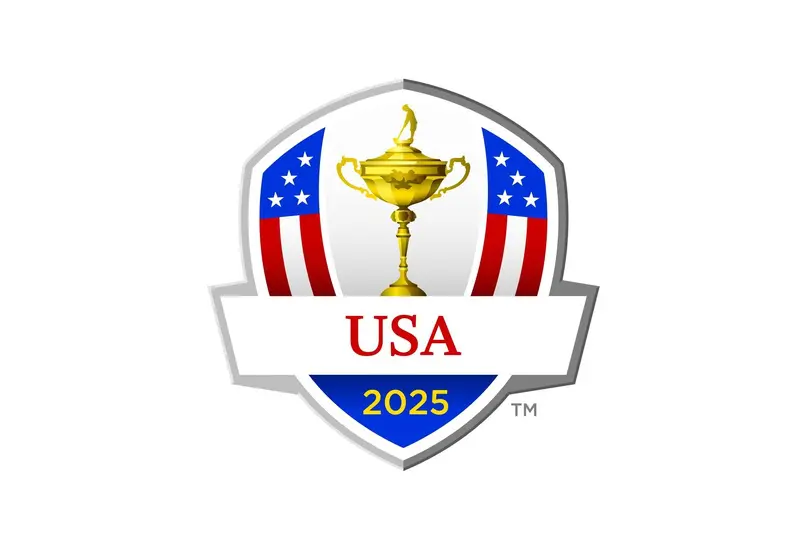
Sam Burns
- World Ranking: 22
- Ryder Cup Record: 1-2-0

Patrick Cantlay
- World Ranking: 21
- Ryder Cup Record: 5-2-1

Bryson DeChambeau
- World Ranking: 18
- Ryder Cup Record: 2-3-1

Harris English
- World Ranking: 10
- Ryder Cup Record: 1-2-0

Ben Griffin
- World Ranking: 17
- Ryder Cup Record: Debut

Russell Henley
- World Ranking: 4
- Ryder Cup Record: Debut

Collin Morikawa
- World Ranking: 8
- Ryder Cup Record: 4-3-1

Xander Schauffele
- World Ranking: 3
- Ryder Cup Record: 4-4-0

J.J. Spaun
- World Ranking: 7
- Ryder Cup Record: Debut

Scottie Scheffler
- World Ranking: 1
- Ryder Cup Record: 2-2-3

Justin Thomas
- World Ranking: 5
- Ryder Cup Record: 7-4-2

Cameron Young
- World Ranking: 20
- Ryder Cup Record: Debut
Ryder Cup Team Europe 2025
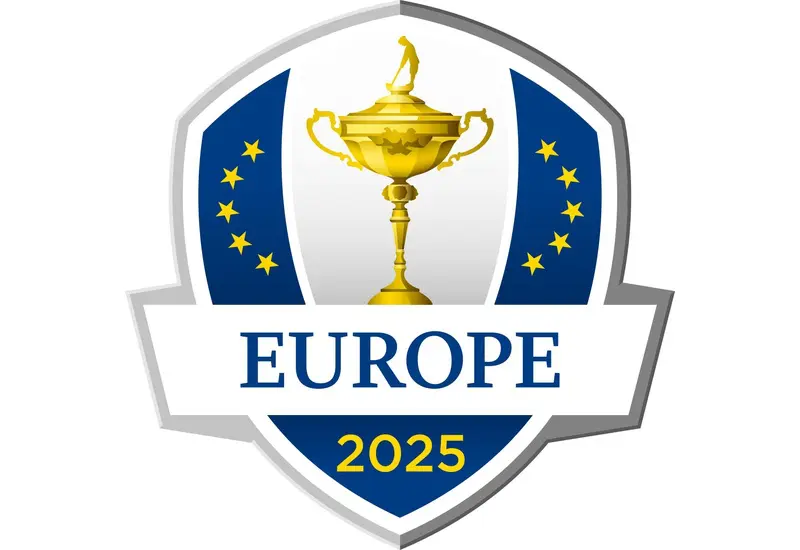
Ludvig Aberg
- World Ranking: 14
- Ryder Cup Record: 2-2-0

Matt Fitzpatrick
- World Ranking: 34
- Ryder Cup Record: 1-7-0

Tommy Fleetwood
- World Ranking: 6
- Ryder Cup Record: 7-3-2

Tyrrell Hatton
- World Ranking: 25
- Ryder Cup Record: 5-4-2

Rasmus Hojgaard
- World Ranking: 52
- Ryder Cup Record: Debut

Viktor Hovland
- World Ranking: 15
- Ryder Cup Record: 3-4-3

Shane Lowry
- World Ranking: 23
- Ryder Cup Record: 2-3-1

Robert MacIntyre
- World Ranking: 9
- Ryder Cup Record: 2-0-1

Rory McIlroy
- World Ranking: 2
- Ryder Cup Record: 16-13-4

Jon Rahm
- World Ranking: 80
- Ryder Cup Record: 6-3-3

Justin Rose
- World Ranking: 12
- Ryder Cup Record: 14-9-3

Sepp Straka
- World Ranking: 13
- Ryder Cup Record: 1-2-0
Ryder Cup history, stats and records
- The Ryder Cup is the result of several attempts in the 1920s to encourage top players from Great Britain and the United States to make the journey across the pond for each other’s national championships. When an unusually large number of leading American golfers turned up for the 1926 Open Championship, the great Walter Hagen rounded up 10 of his compatriots to take on 10 of the best British players in a matchplay event at the Wentworth Club. The contest, won 13-1 by the Brits, was sponsored by one Samuel Ryder – a prominent businessman and prolific golf patron of the era.
Due to a number of technicalities, however, most golf historians insist the first staging of the Ryder Cup did not take place until the following year. The 1927 match at Worcester Golf Club in Massachusetts was a much more formal affair than its predecessor, with a proper set of rules and a Deed of Trust drawn up for the occasion. From then on, the Ryder Cup was staged every two years between 12 born-and-bred representatives of Great Britain and of the United States.
Matches were evenly contested prior to World War II, with the US winning four times and the British twice. That all changed after the war, however, as the Americans reeled off 14 wins in 15 contests between 1947 and 1977. Even the addition of Irish players from 1953 onwards did little to aid the Brits. Such was the scope of America’s dominance that Jack Nicklaus pushed for the opposing team to include all of Europe – an idea that was adopted in 1979.
That move ushered in an exciting new era for the Ryder Cup. Now able to call on the likes of Seve Ballesteros and Bernhard Langer as well as Nick Faldo, Ian Woosnam and Sandy Lyle, the European team broke a 28-year drought in 1985 and went on to win three in a row. Seve’s infamous spats with Paul Azinger in 1989 and 1991 took the rivalry to a new level and boosted public interest through the roof. Tight, testy, hard-fought matches have been the norm ever since, with contests often coming down to the final pairings on Sunday afternoon.
YEAR WINNER SCORE HOST COURSE TEAM CAPTAINS 2023 Europe 16.5-11.5 Marco Simone Golf & Country Club (Rome, Italy) Luke Donald
Zach Johnson2021 United States 19-9 Whistling Straits (Wisconsin, USA) Steve Stricker
Padraig Harrington2018 Europe 17.5-10.5 Le Golf National (Paris, France) Jim Furyk
Thomas Bjorn2016 United States 17-11 Hazeltine National (Minnesota, USA) David Love III
Darren Clarke2014 Europe 16.5-11.5 Gleneagles (Perth & Kinross, Scotland) Paul McGinley
Tom Watson2012 Europe 14.5-13.5 Medinah (Illinois, USA) Davis Love III
Jose Maria Olazabal2010 Europe 14.5-13.5 Celtic Manor (Newport, Wales) Colin Montgomerie
Corey Pavin2008 United States 16.5-11.5 Valhalla (Kentucky, USA) Paul Azinger
Nick Faldo2006 Europe 18.5-9.5 K Club (Kildare, Ireland) Ian Woosnam
Tom Lehman2004 Europe 18.5-9.5 Oakland Hills (Michigan, USA) Hal Sutton
Bernhard Langer2002 Europe 15.5-12.5 The Belfry (Warwickshire, England) Sam Torrance
Curtis Strange2001 MATCHES POSTPONED DUE TO 9/11 ATTACKS 1999 United States 14.5-13.5 The Country Club (Massachusetts, USA) Ben Crenshaw
Mark James1997 Europe 14.5-13.5 Valderrama (Andalusia, Spain) Seve Ballesteros
Tom Kite1995 Europe 14.5-13.5 Oak Hill (New York, USA) Lanny Wadkins
Bernard Gallacher1993 United States 15-13 The Belfry (Warwickshire, England) Bernard Gallacher
Tom Watson1991 United States 14.5-13.5 Kiawah Island (South Carolina, USA) Dave Stockton
Bernard Gallacher1989 Europe* 14-14 The Belfry (Warwickshire, England) Tony Jacklin
Raymond Floyd1987 Europe 15-13 Muirfield Village (Ohio, USA) Jack Nicklaus
Tony Jacklin1985 Europe 16.5-11.5 The Belfry (Warwickshire, England) Tony Jacklin
Lee Trevino1983 United States 14.5-13.5 PGA National (Florida, USA) Jack Nicklaus
Tony Jacklin1981 United States 18.5-9.5 Walton Heath (Surrey, England) John Jacobs
Dave Marr1979 United States 17-11 The Greenbrier (West Virginia, USA) Billy Casper
John Jacobs1977 United States 12.5-7.5 Royal Lytham & St Annes (Lancashire, England) Brian Huggett
Dow Finsterwald1975 United States 21-11 Laurel Valley (Pennsylvania, USA) Arnold Palmer
Bernard Hunt1973 United States 19-13 Muirfield (East Lothian, Scotland) Bernard Hunt
Jack Burke Jr.1971 United States 18.5-13.5 Old Warson (Missouri, USA) Jay Hebert
Eric Brown1969 United States* 16-16 Royal Birkdale (Lancashire, England) Eric Brown
Sam Snead1967 United States 23.5-8.5 Champions (Texas, USA) Ben Hogan
Dai Rees1965 United States 19.5-12.5 Royal Birkdale (Lancashire, England) Harry Weetman
Byron Nelson1963 United States 23-9 Atlanta Athletic (Georgia, USA) Arnold Palmer
John Fallon1961 United States 14.5-9.5 Royal Lytham & St Annes (Lancashire, England) Dai Rees
Jerry Barber1959 United States 8.5-3.5 Eldorado (California, USA) Sam Snead
Dai Rees1957 Great Britain 7.5-4.5 Lindrick (West Riding of Yorkshire, England) Dai Rees
Jack Burke Jr.1955 United States 8-4 Thunderbird (California, USA) Chick Harbert
Dai Rees1953 United States 6.5-5.5 Wentworth (Surrey, England) Henry Cotton
Lloyd Mangrum1951 United States 9.5-2.5 Pinehurst (North Carolina, USA) Sam Snead
Arthur Lacey1949 United States 7-5 Ganton (Yorkshire, England) Charles Whitcombe
Ben Hogan1947 United States 11-1 Portland (Oregon, USA) Ben Hogan
Henry CottonNO MATCHES DUE TO WORLD WAR II 1937 United States 8-4 Southport & Ainsdale (Lancashire, England) Charles Whitcombe
Walter Hagen1935 United States 9-3 Ridgewood (New Jersey, USA) Walter Hagen
Charles Whitcombe1933 Great Britain 6.5-5.5 Southport & Ainsdale (Lancashire, England) J.H. Taylor
Walter Hagen1931 United States 9-3 Scioto (Ohio, USA) Walter Hagen
Charles Whitcombe1929 Great Britain 7-5 Moortown (Yorkshire, England) George Duncan
Walter Hagen1927 United States 9.5-2.5 Worcester (Massachusetts, USA) Walter Hagen
Ted Ray* In the event of a draw, the previous winner retains the trophy.
- Most appearances: 12 – Phil Mickelson (1995-2018)
- Most points won: 28.5 – Sergio Garcia (22-11-7)
- Most singles points: 7 – Colin Montgomerie (6-0-2), Billy Casper (6-2-2), Lee Trevino (6-2-2), Arnold Palmer (6-3-2), Neil Coles (5-6-4)
- Most foursome points: 13.5 – Sergio García (12–4–3
- Most fourball points: 10.5 – Ian Woosnam (10-3-1), Jose Maria Olazabal (9-2-3)
- Most points by a pairing: 12 – Seve Ballesteros and Jose Maria Olazabal (11-2-2)
- Best winning percentage: 100% – Jimmy Demaret (6-0-0)
- Most points in a contest: 5 – Peter Alliss (1965), Tony Lema (1965), Gardner Dickinson (1967), Arnold Palmer (1967), Tony Jacklin (1969), Jack Nicklaus (1971), Larry Nelson (1979), Francesco Molinari (2018)






